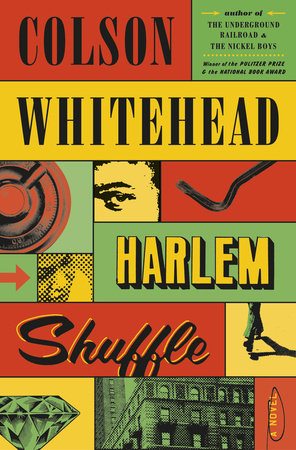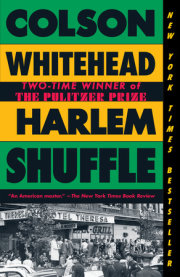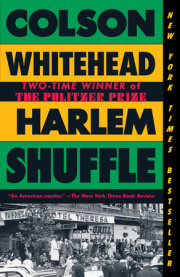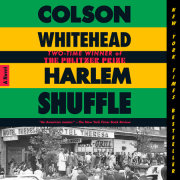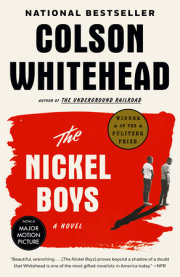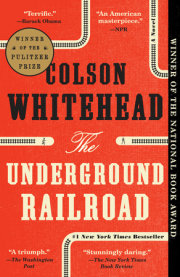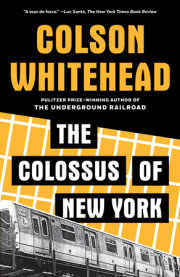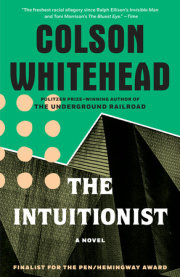CHAPTER ONE
His cousin Freddie brought him on the heist one hot night in early June. Ray Carney was having one of his run-around days—uptown, downtown, zipping across the city. Keeping the machine humming. First up was Radio Row, to unload the final three consoles, two RCAs and a Magnavox, and pick up the TV he left. He’d given up on the radios, hadn’t sold one in a year and a half no matter how much he marked them down and begged. Now they took up space in the basement that he needed for the new recliners coming in from Argent next week and whatever he picked up from the dead lady’s apartment that afternoon. The radios were top-of-the-line three years ago; now padded blankets hid their slick mahogany cabinets, fastened by leather straps to the truck bed. The pickup bounced in the unholy rut of the West Side Highway.
Just that morning there was another article in the Tribune about the city tearing down the elevated highway. Narrow and indifferently cobblestoned, the road was a botch from the start. On the best days it was bumper-to-bumper, a bitter argument of honks and curses, and on rainy days the potholes were treacherous lagoons, one grim slosh. Last week a customer wandered into the store with his head wrapped like a mummy—beaned by a chunk of falling balustrade while walking under the damn thing. Said he was going to sue. Carney said, “You’re in your rights.” Around Twenty-Third Street the pickup’s wheels bit into a crater and he thought one of the RCAs was going to launch from the bed into the Hudson River. He was relieved when he was able to sneak off at Duane Street without incident.
Carney’s man on Radio Row was halfway down Cortlandt, off Greenwich, right in the thick. He got a space outside Samuel’s Amazing Radio—repair all makes—and went to check that Aronowitz was in. Twice in the last year he’d come all the way down to find the shop shut in the middle of the day.
A few years ago, walking past the crammed storefronts was like twirling a radio dial—this store blared jazz into the street out of horn loudspeakers, the next store German symphonies, then ragtime, and so on. S & S Electronics, Landy’s Top Notch, Steinway the Radio King. Now he was more likely to hear rock and roll, in a desperate lure of the teenage scene, and to find the windows crammed with television sets, the latest wonders from DuMont and Motorola and the rest. Consoles in blond hardwood, the sleek new portable lines, and three-in-one hi-fi combos with picture tube, tuner, and turntable in the same cabinet, smart. What hadn’t changed was Carney’s meandering sidewalk route around the massive bins and buckets of vacuum tubes, audio transformers, and condensers that drew in tinkerers from all over the tri-state. Any part you need, all makes, all models, reasonable prices.
There was a hole in the air where the Ninth Avenue el used to run. That disappeared thing. His father had taken him here once or twice on one of his mysterious errands, when he was little. Carney still thought he heard the train sometimes, rumbling behind the music and haggling of the street.
Aronowitz hunched over the glass counter, with a loupe screwed into his eye socket, poking one of his gizmos. “Mr. Carney.” He coughed.
There weren’t many white men who called him mister. Downtown, anyway. The first time Carney came to the Row on business, the white clerks pretended not to see him, attending to hobbyists who came in after him. He cleared his throat, he gestured, and remained a black ghost, store after store, accumulating the standard humiliations, until he climbed the black iron steps to Aronowitz & Sons and the proprietor asked, “Can I help you, sir?” Can I help you as in Can I help you? As opposed to What are you doing here? Ray Carney, in his years, had a handle on the variations.
That first day, Carney told him he had a radio in need of repair; he had just picked up his sideline in gently used appliances. Aronowitz cut him off when he tried to explain the problem and got to work unscrewing the case. Carney didn’t waste his breath on subsequent visits, merely set the radios before the maestro and let him have his way with it. The routine went: weary sighs and grunts as he surveyed the problem, with a jab and flash of silver implements. His Diagnometer tested fuses, resistors; he calibrated voltage, rummaged through unlabeled trays in the steel filing cabinets along the walls of the gloomy shop. If something big was afoot, Aronowitz twirled in his chair and scurried into the workshop in the back, to more grunts. He reminded Carney of a squirrel in the park, darting helter-skelter after lost nuts. Maybe the other squirrels of Radio Row understood this behavior, but it was animal madness to this civilian.
Often Carney went down the street for a ham and cheese to let the man work in peace.
Aronowitz never failed to make the fix, find the part. The new technology vexed the old man, however, and he usually had Carney return the next day for TV sets, or the next week once the new picture tube or valve arrived. Refusing to shame himself by walking down the block to hit up a competitor. That’s how Carney ended up there that morning. He’d dropped off the twenty-one-inch Philco last week. If he was lucky, the old man would take the radios off his hands.
Carney carried one of the big RCAs into the shop and went back for the next. “I’d have the boy help you,” Aronowitz said, “but I had to cut back on his hours.”
The boy Jacob, a surly, pockmarked teenager from a Ludlow Street rookery, hadn’t worked there for more than a year as far as Carney could tell. The “& Sons” on the sign had ever been aspirational—Aronowitz’s wife had moved back to Jersey to live with her sister long ago—but bluster and bravado were a motif for Radio Row establishments. Top of the City, House of Values, Cannot Be Beaten. Decades before, the electronics boom made the neighborhood into a theater for immigrant ambition. Hang a shingle, deliver your pitch, and climb out of the tenement stew. If things go well, you open a second location, expand into the failed shop next door. Pass the business on to your sons and retire to one of the new Long Island suburbs. If things go well.
Carney thought Aronowitz should drop the Sons thing and go for something more hip: Atomic TV & Radio, Jet Age Electronics. But that’d be a reversal of their relationship, as it was Aronowitz who delivered the advice at this address, one entrepreneur to another, generally of the “physician, heal thyself” variety. Carney didn’t need the old man’s tips on accounting practices and merchandise placement. His business degree from Queens College hung in his office next to a signed photograph of Lena Horne.
Carney got the three radios inside. Sidewalk traffic on the Row wasn’t what it used to be.
“No, they’re not broken,” Carney said as Aronowitz unfurled his roll of instruments. The roll was green felt, with slots. “I thought you’d want them, maybe.”
“Nothing wrong with them?” Like something that worked okay was an alien proposition.
“I figured I was coming down to pick up the TV, I’d see if you were interested.” On the one hand, why would a radio man need a radio, but on the other, every businessman had a sideline. He knew this to be true of Aronowitz. “Strip them for parts or something?”
Aronowitz’s shoulders dropped. “Parts. I sure don’t have customers, Mr. Carney, but I have parts.”
“You have me, Aronowitz.”
“I have you, Mr. Carney. And you are very reliable.” He asked after Carney’s wife and daughter. A baby on the way? Mazel tov. He ran a thumb down his black suspenders and considered. Dust squirmed in the light. “I know a guy in Camden,” Aronowitz said, “he specializes. Likes RCAs. Maybe he’s interested. Or he isn’t. You leave them, next time you come in, I’ll tell you how it went.” There was the matter of the Magnavox. Walnut cabinet, eighteen-inch woofer, Collaro changer. And top-of-the-line three years ago. “Leave that, too, we’ll see.”
The old man had always been droopy in the face, a jowl overall with saggy lobes and eyelids, and droopy in his wretched posture. As if when he bent over the machines all those hours they were sucking him into themselves. The downward pull had accelerated recently, his submission to the facts of his life. The merchandise had changed, the clientele transformed into new beings, and aspiration wasn’t all it was cracked up to be. But he had a few diversions to keep him busy, these twilight days.
“I have your TV,” he said. He coughed into a faded yellow handkerchief. Carney followed him into the back.
The name of the store—stark letters in gold paint on the shop window—promised one thing, the shabby front office another, and this room delivered a third thing that was entirely spiritual. The atmosphere was different, murky yet reverential, the Radio Row hubbub hushed. Disassembled receivers, picture tubes in various sizes, guts of machines lay on cluttered metal shelves. In the center of the room, the worktable was spotlit where a blank space in the scarred wood waited for the next patient, tools and boxy measuring instruments arranged neatly around it. Fifty years ago, most of the stuff in the room hadn’t existed, was half a notion scurrying at the edge of an inventor’s imagination—and suddenly there were rooms like this, where men maintained its secrets.
Until the next thing came along.
There was a collapsible army cot where the boy’s desk used to be, a plaid wool blanket curled in an S on top. Had he been sleeping there? As the radio man led him, Carney saw that he’d lost still more weight. He thought about asking after his health, but didn’t.
Aronowitz kept a dusty display of transistor radios by the front door, but in the back items moved in more constant exchange. Carney’s Philco 4242 sat on the floor. Freddie had steered it into Carney’s store on a creaky dolly, swore it was in “A-1 condition.” Some days Carney felt the need to press his cousin on a lie until it broke and some days his love was such that the slightest quiver of mistrust made him ashamed. When he’d plugged in the TV and turned it on, his reward was a white dot in the middle of the tube and a petulant hum. He didn’t ask where Freddie got it. He never asked. The TVs moved quickly out of the gently used section when Carney priced them right.
“Still in the box,” Carney said.
“What? Oh, those.”
There was a stack of four Silvertone TVs by the bathroom door, blond-wood Lowboy Consoles, all-channel. Sears manufactured them, and Carney’s customers revered Sears from childhood, when their parents ordered from catalogs because the white men in their Southern towns wouldn’t sell to them, or jacked up the prices.
“A man brought those by yesterday,” Aronowitz said. “I was told they fell off a truck.”
“Boxes look fine.”
“A very short fall, then.”
A hundred and eighty-nine retail, let’s say another twenty with the Harlem tax from a white store; overcharging was not limited to south of the Mason-Dixon. Carney said, “I could probably sell one to a customer in the market.” A hundred fifty on installments, they’d sprout feet and march out the door singing “The Star-Spangled Banner.”
“I can part with two. I’ll throw in the work on the Philco. It was just a loose lead.”
They did a deal for the TVs. On his way out the door, Aronowitz asked, “Can you help me bring your radios into the back? I like to keep the front presentable.”
Uptown Carney took Ninth Avenue, not trusting the highway with his new TVs. Down three radios, up three sets—not a bad start to the day. He had Rusty unload the TVs into the store and drove up to the dead lady’s house, 141st Street. Lunch was two hot dogs and a coffee at Chock Full o’Nuts.
***
3461 Broadway had a busted elevator. The sign had been up for a while. Carney counted the steps to the fourth floor. If he bought something and lugged it out to the truck, he liked to know how many steps to curse on the way down. On the second floor, someone was boiling pigs’ feet and on the third, old socks from the smell of it. This had the feel of a wasted trip.
The daughter, Ruby Brown, let him in. The tenement had settled, and as she opened the door to 4G, it scraped the floor.
“Raymond,” she said.
He couldn’t place her.
“We were at Carver together, I was a few years behind you.”
He nodded as if he remembered. “I’m sorry about your loss.”
She thanked him and glanced down for a moment. “I came up to take care of things and Timmy James told me to call you.”
Didn’t know who he was, either. When he first got the pickup and started lending it out, and then buying furniture, he knew everyone. Now he’d been in business long enough that word had spread outside his old circle.
Ruby flicked on the hall light. They passed the galley kitchen and the two bedrooms off the hall. The walls were scuffed, gouged to plaster in spots—the Browns had lived there a long time. A wasted trip. In general when he got a furniture call, people had strange ideas about what he was looking for. Like he’d take any old thing, the saggy couch with springs poking out nappily, the recliner with sweated-into arms. He wasn’t the junkman. The good finds were worth it, but he wasted too much time on false leads. If Rusty’d had any sense or taste, Carney could send his assistant on these missions, but he didn’t have sense or taste. Come back with something that looked like raccoons nested in the horsehair stuffing.
Carney was wrong this time. The bright front room overlooked Broadway and the sound of an ambulance snuck in through the window. The dinette set in the corner was from the ’30s, chipped and discolored, and the faded oval rug revealed traffic patterns, but the sofa and armchair were in factory condition. Heywood-Wakefield with that champagne finish everybody liked now. And sheathed in transparent vinyl slipcovers.
“I live in D.C. now,” Ruby said. “I work in a hospital. But I’d been telling my mother to get rid of the couch for years, it was so old. Two months ago I bought these for her.”
“D.C.?” he said. He unzipped the plastic.
“I like it there. There’s less of that, you know?” She gestured toward the Broadway chaos below.
“Sure.” He ran his hand over the green velvet upholstery: pristine. “It’s from Mr. Harold’s?” She hadn’t bought the sofa from him, and Blumstein’s didn’t carry the line, so it had to be Mr. Harold’s.
“Yes.”
“Took good care of them,” Carney said.
Copyright © 2021 by Colson Whitehead. All rights reserved. No part of this excerpt may be reproduced or reprinted without permission in writing from the publisher.

